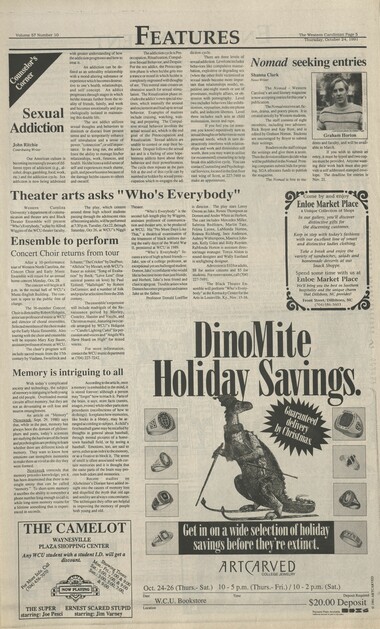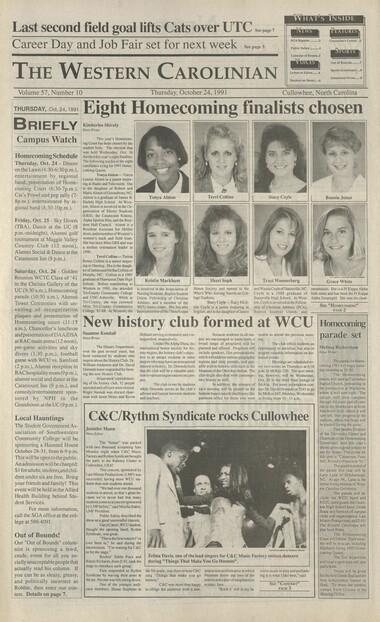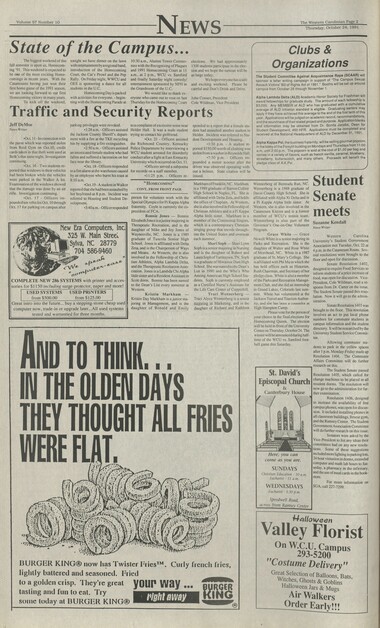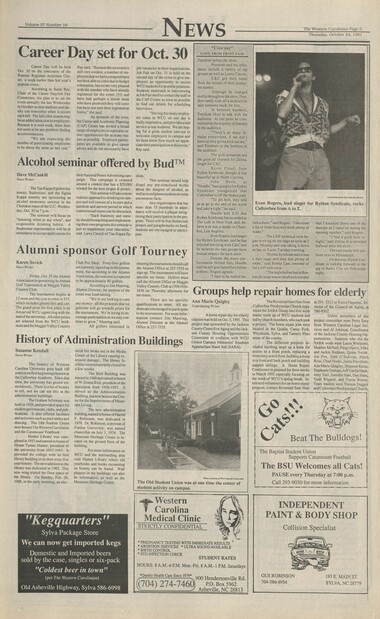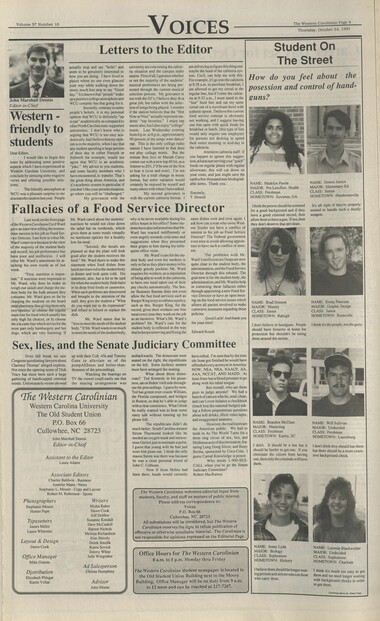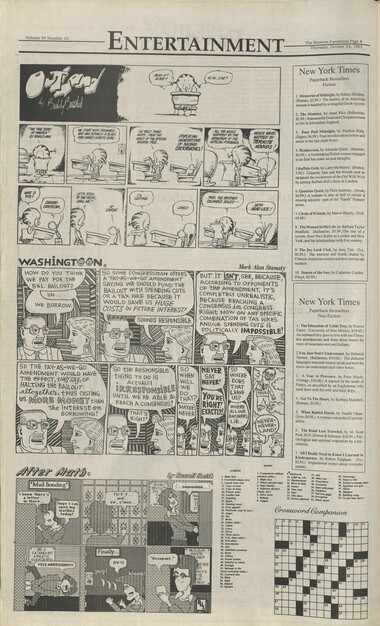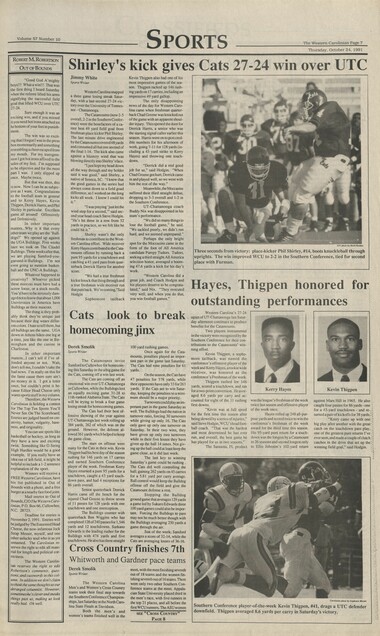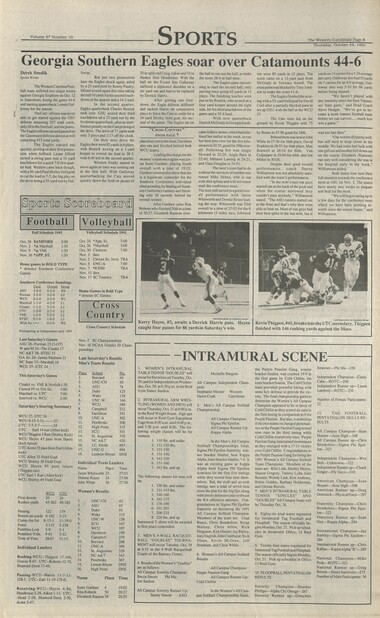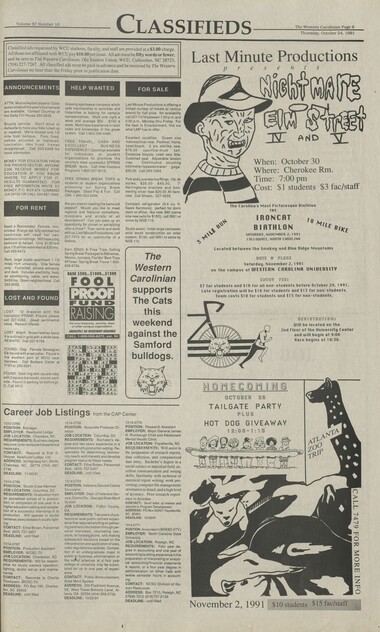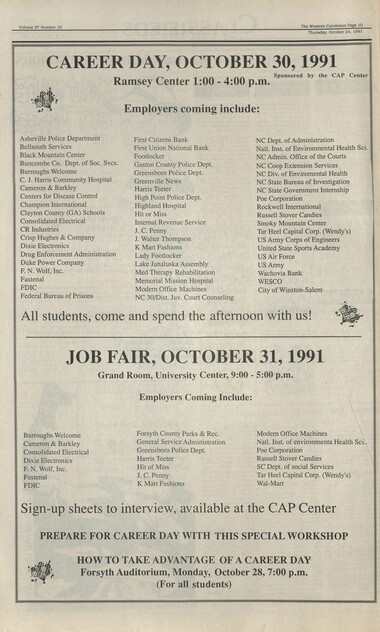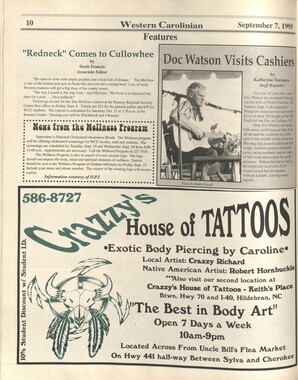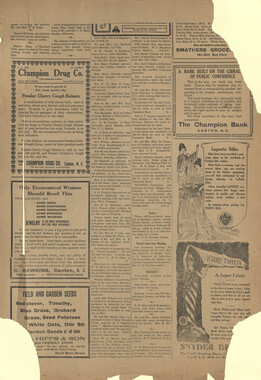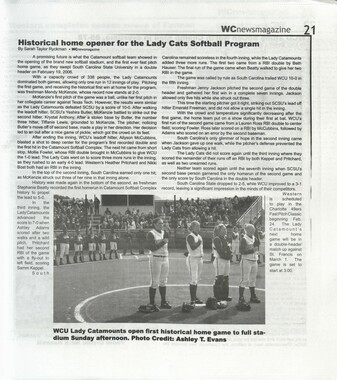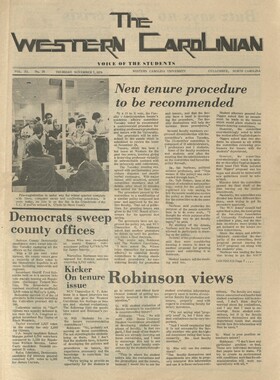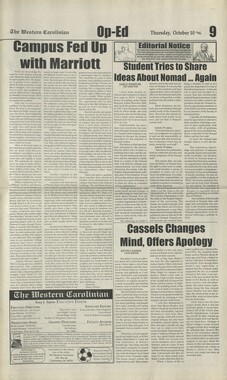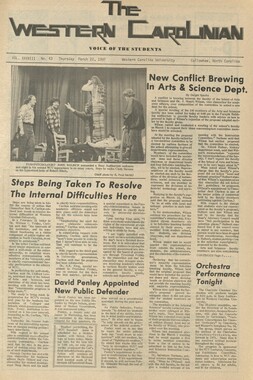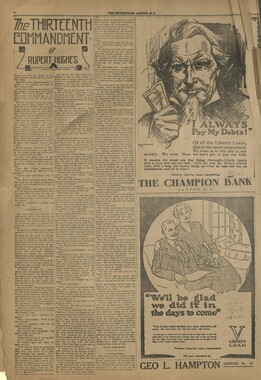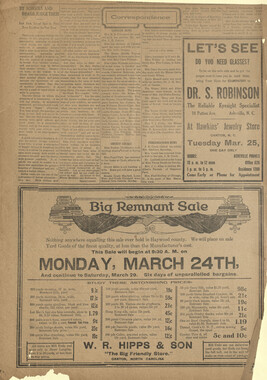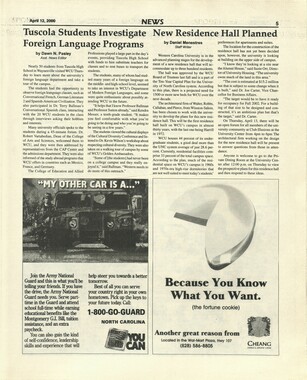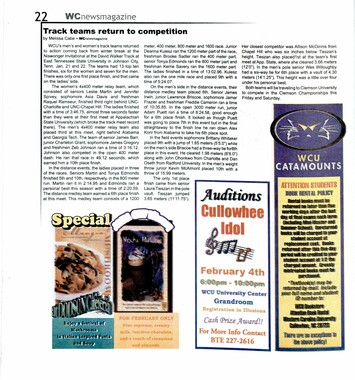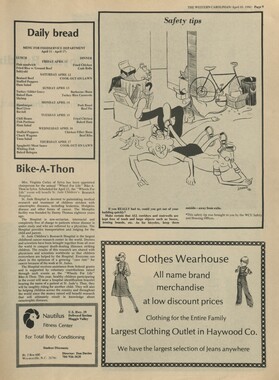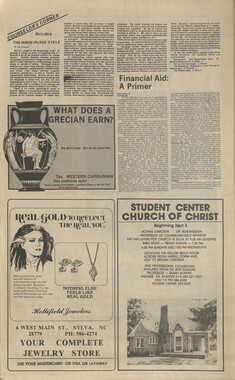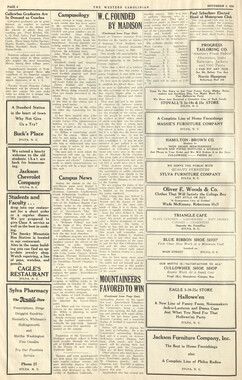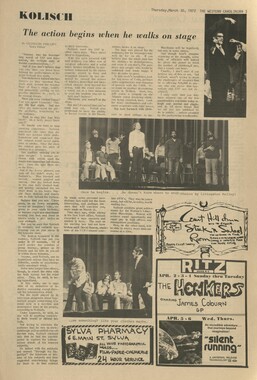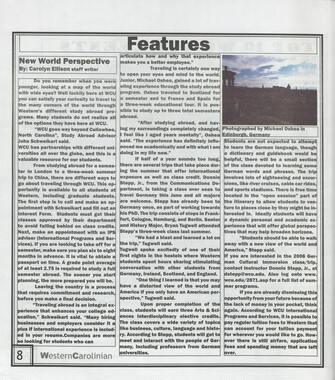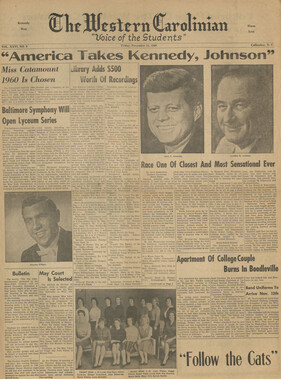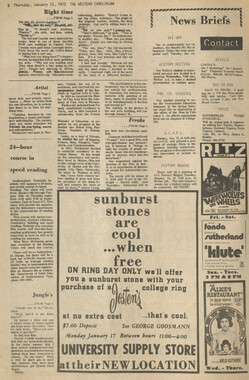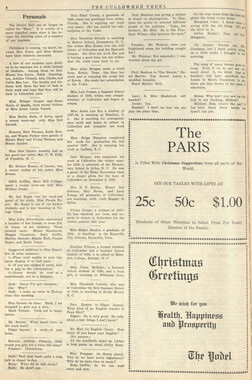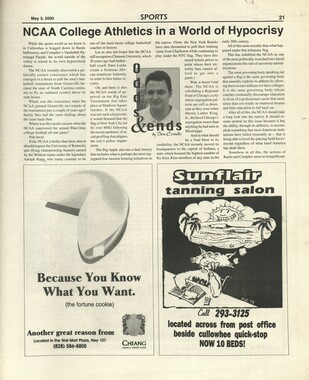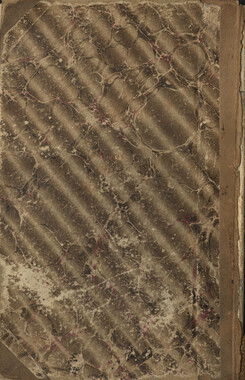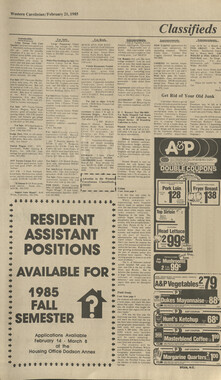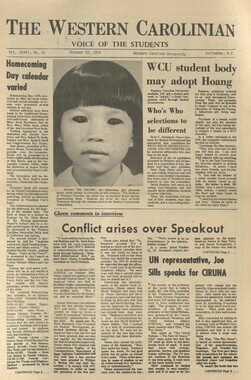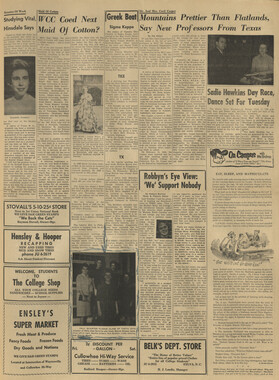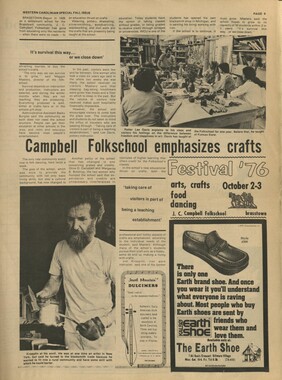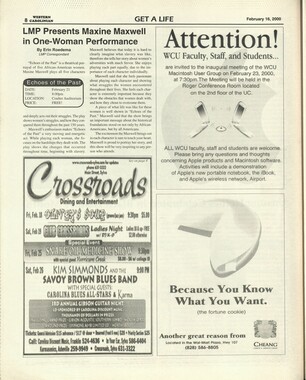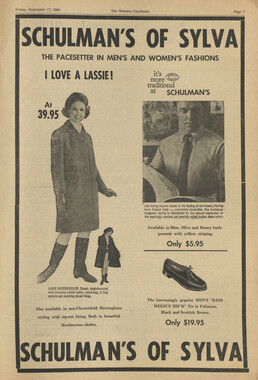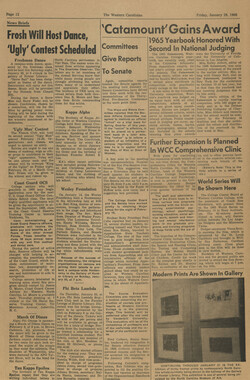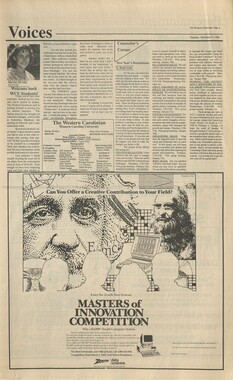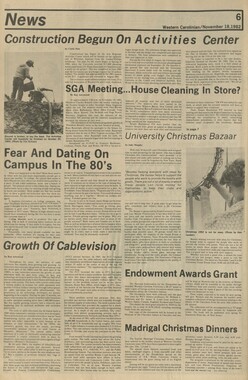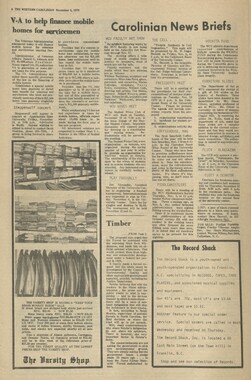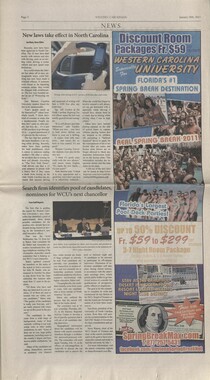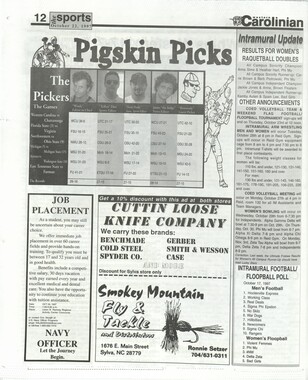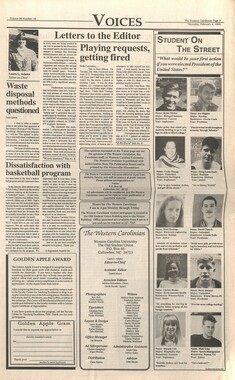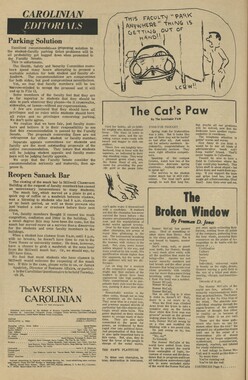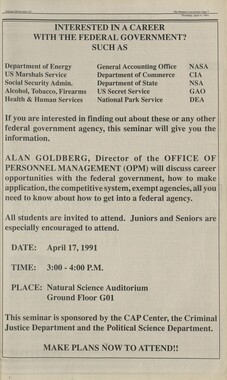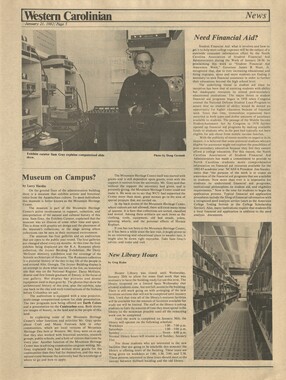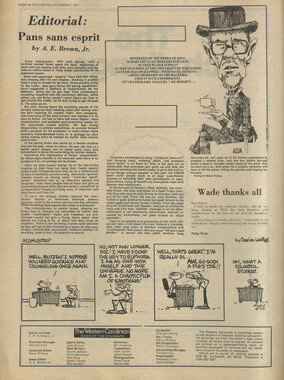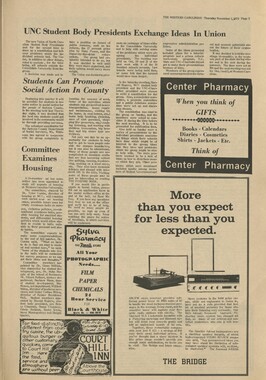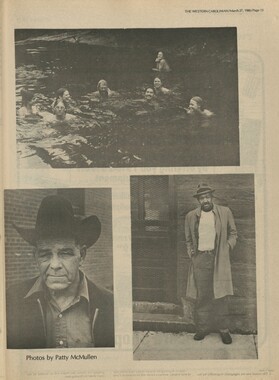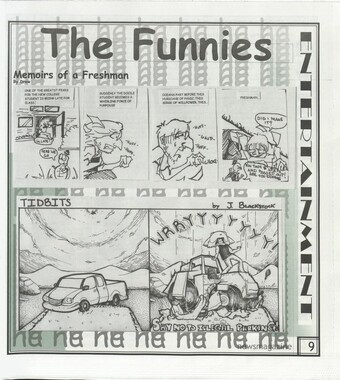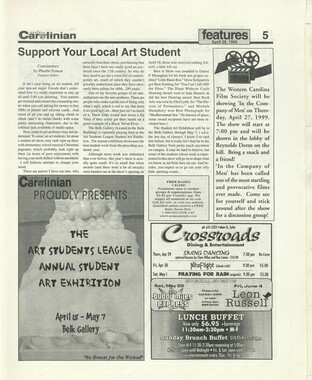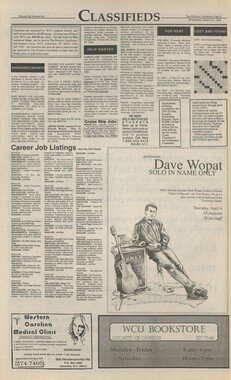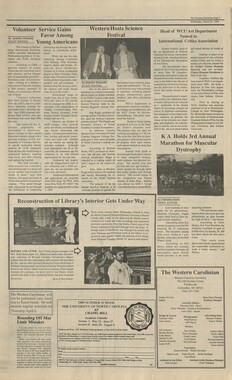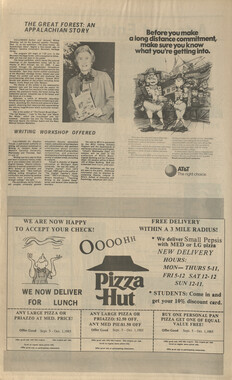Western Carolina University (20)
View all
- Canton Champion Fibre Company (2308)
- Cherokee Traditions (291)
- Civil War in Southern Appalachia (165)
- Craft Revival (1942)
- Great Smoky Mountains - A Park for America (2946)
- Highlights from Western Carolina University (430)
- Horace Kephart (941)
- Journeys Through Jackson (159)
- LGBTQIA+ Archive of Jackson County (85)
- Oral Histories of Western North Carolina (314)
- Picturing Appalachia (6873)
- Stories of Mountain Folk (413)
- Travel Western North Carolina (160)
- Western Carolina University Fine Art Museum Vitreograph Collection (129)
- Western Carolina University Herbarium (92)
- Western Carolina University: Making Memories (738)
- Western Carolina University Publications (2491)
- Western Carolina University Restricted Electronic Theses and Dissertations (146)
- Western North Carolina Regional Maps (71)
- World War II in Southern Appalachia (131)
University of North Carolina Asheville (6)
View all
- Allanstand Cottage Industries (62)
- Appalachian National Park Association (53)
- Bennett, Kelly, 1890-1974 (1463)
- Berry, Walter (76)
- Brasstown Carvers (40)
- Carver, George Washington, 1864?-1943 (26)
- Cathey, Joseph, 1803-1874 (1)
- Champion Fibre Company (233)
- Champion Paper and Fibre Company (297)
- Cherokee Indian Fair Association (16)
- Cherokee Language Program (22)
- Crowe, Amanda (40)
- Edmonston, Thomas Benton, 1842-1907 (7)
- Ensley, A. L. (Abraham Lincoln), 1865-1948 (275)
- Fromer, Irving Rhodes, 1913-1994 (70)
- George Butz (BFS 1907) (46)
- Goodrich, Frances Louisa (120)
- Grant, George Alexander, 1891-1964 (96)
- Heard, Marian Gladys (60)
- Kephart, Calvin, 1883-1969 (15)
- Kephart, Horace, 1862-1931 (313)
- Kephart, Laura, 1862-1954 (39)
- Laney, Gideon Thomas, 1889-1976 (439)
- Masa, George, 1881-1933 (61)
- McElhinney, William Julian, 1896-1953 (44)
- Niggli, Josephina, 1910-1983 (10)
- North Carolina Park Commission (105)
- Osborne, Kezia Stradley (9)
- Owens, Samuel Robert, 1918-1995 (11)
- Penland Weavers and Potters (36)
- Roberts, Vivienne (15)
- Roth, Albert, 1890-1974 (142)
- Schenck, Carl Alwin, 1868-1955 (1)
- Sherrill's Photography Studio (2565)
- Southern Highland Handicraft Guild (127)
- Southern Highlanders, Inc. (71)
- Stalcup, Jesse Bryson (46)
- Stearns, I. K. (213)
- Thompson, James Edward, 1880-1976 (226)
- United States. Indian Arts and Crafts Board (130)
- USFS (683)
- Vance, Zebulon Baird, 1830-1894 (1)
- Weaver, Zebulon, 1872-1948 (58)
- Western Carolina College (230)
- Western Carolina Teachers College (282)
- Western Carolina University (2008)
- Western Carolina University. Mountain Heritage Center (18)
- Whitman, Walt, 1819-1892 (10)
- Wilburn, Hiram Coleman, 1880-1967 (73)
- Williams, Isadora (3)
- Cain, Doreyl Ammons (0)
- Crittenden, Lorraine (0)
- Rhodes, Judy (0)
- Smith, Edward Clark (0)
- Appalachian Region, Southern (2569)
- Asheville (N.C.) (1923)
- Avery County (N.C.) (26)
- Blount County (Tenn.) (195)
- Buncombe County (N.C.) (1672)
- Cherokee County (N.C.) (283)
- Clay County (N.C.) (555)
- Graham County (N.C.) (236)
- Great Smoky Mountains National Park (N.C. and Tenn.) (519)
- Haywood County (N.C.) (3569)
- Henderson County (N.C.) (70)
- Jackson County (N.C.) (4912)
- Knox County (Tenn.) (35)
- Knoxville (Tenn.) (13)
- Lake Santeetlah (N.C.) (10)
- Macon County (N.C.) (420)
- Madison County (N.C.) (215)
- McDowell County (N.C.) (39)
- Mitchell County (N.C.) (132)
- Polk County (N.C.) (35)
- Qualla Boundary (982)
- Rutherford County (N.C.) (76)
- Swain County (N.C.) (2182)
- Transylvania County (N.C.) (270)
- Watauga County (N.C.) (12)
- Waynesville (N.C.) (86)
- Yancey County (N.C.) (72)
- Aerial Photographs (3)
- Aerial Views (60)
- Albums (books) (4)
- Articles (1)
- Artifacts (object Genre) (228)
- Bibliographies (1)
- Biography (general Genre) (2)
- Cards (information Artifacts) (38)
- Clippings (information Artifacts) (191)
- Copybooks (instructional Materials) (3)
- Crafts (art Genres) (622)
- Depictions (visual Works) (21)
- Design Drawings (1)
- Drawings (visual Works) (185)
- Envelopes (73)
- Exhibitions (events) (1)
- Facsimiles (reproductions) (1)
- Fiction (general Genre) (4)
- Financial Records (12)
- Fliers (printed Matter) (67)
- Glass Plate Negatives (381)
- Guidebooks (2)
- Internegatives (10)
- Interviews (815)
- Land Surveys (102)
- Letters (correspondence) (1013)
- Manuscripts (documents) (618)
- Maps (documents) (177)
- Memorandums (25)
- Minutes (administrative Records) (59)
- Negatives (photographs) (6090)
- Newsletters (1290)
- Newspapers (2)
- Notebooks (8)
- Occupation Currency (1)
- Paintings (visual Works) (1)
- Pen And Ink Drawings (1)
- Periodicals (193)
- Personal Narratives (10)
- Photographs (12976)
- Plans (maps) (1)
- Poetry (5)
- Portraits (4568)
- Postcards (329)
- Programs (documents) (181)
- Publications (documents) (2443)
- Questionnaires (65)
- Relief Prints (26)
- Sayings (literary Genre) (1)
- Scrapbooks (282)
- Sheet Music (2)
- Slides (photographs) (402)
- Songs (musical Compositions) (2)
- Sound Recordings (796)
- Specimens (92)
- Speeches (documents) (18)
- Tintypes (photographs) (8)
- Transcripts (322)
- Video Recordings (physical Artifacts) (23)
- Text Messages (0)
- A.L. Ensley Collection (275)
- Appalachian Industrial School Records (7)
- Appalachian National Park Association Records (336)
- Axley-Meroney Collection (2)
- Bayard Wootten Photograph Collection (20)
- Bethel Rural Community Organization Collection (7)
- Blumer Collection (5)
- C.W. Slagle Collection (20)
- Canton Area Historical Museum (2110)
- Carlos C. Campbell Collection (462)
- Cataloochee History Project (64)
- Cherokee Studies Collection (4)
- Daisy Dame Photograph Album (5)
- Daniel Boone VI Collection (1)
- Doris Ulmann Photograph Collection (112)
- Elizabeth H. Lasley Collection (1)
- Elizabeth Woolworth Szold Fleharty Collection (4)
- Frank Fry Collection (95)
- George Masa Collection (173)
- Gideon Laney Collection (452)
- Hazel Scarborough Collection (2)
- Hiram C. Wilburn Papers (28)
- Historic Photographs Collection (236)
- Horace Kephart Collection (861)
- Humbard Collection (33)
- Hunter and Weaver Families Collection (1)
- I. D. Blumenthal Collection (4)
- Isadora Williams Collection (4)
- Jesse Bryson Stalcup Collection (47)
- Jim Thompson Collection (224)
- John B. Battle Collection (7)
- John C. Campbell Folk School Records (80)
- John Parris Collection (6)
- Judaculla Rock project (2)
- Kelly Bennett Collection (1482)
- Love Family Papers (11)
- Major Wiley Parris Civil War Letters (3)
- Map Collection (12)
- McFee-Misemer Civil War Letters (34)
- Mountain Heritage Center Collection (4)
- Norburn - Robertson - Thomson Families Collection (44)
- Pauline Hood Collection (7)
- Pre-Guild Collection (2)
- Qualla Arts and Crafts Mutual Collection (12)
- R.A. Romanes Collection (681)
- Rosser H. Taylor Collection (1)
- Samuel Robert Owens Collection (94)
- Sara Madison Collection (144)
- Sherrill Studio Photo Collection (2558)
- Smoky Mountains Hiking Club Collection (616)
- Stories of Mountain Folk - Radio Programs (374)
- The Reporter, Western Carolina University (510)
- Venoy and Elizabeth Reed Collection (16)
- WCU Gender and Sexuality Oral History Project (32)
- WCU Mountain Heritage Center Oral Histories (25)
- WCU Oral History Collection - Mountain People, Mountain Lives (71)
- WCU Students Newspapers Collection (1923)
- Western North Carolina Tomorrow Black Oral History Project (69)
- William Williams Stringfield Collection (2)
- Zebulon Weaver Collection (109)
- African Americans (390)
- Appalachian Trail (35)
- Artisans (521)
- Cherokee art (84)
- Cherokee artists -- North Carolina (10)
- Cherokee language (21)
- Cherokee pottery (101)
- Cherokee women (208)
- Church buildings (189)
- Civilian Conservation Corps (U.S.) (111)
- College student newspapers and periodicals (2012)
- Dams (107)
- Dance (1023)
- Education (222)
- Floods (61)
- Folk music (1015)
- Forced removal, 1813-1903 (2)
- Forest conservation (220)
- Forests and forestry (1184)
- Gender nonconformity (4)
- Great Smoky Mountains National Park (N.C. and Tenn.) (181)
- Hunting (45)
- Landscape photography (25)
- Logging (119)
- Maps (83)
- Mines and mineral resources (8)
- North Carolina -- Maps (18)
- Paper industry (38)
- Postcards (255)
- Pottery (135)
- Railroad trains (72)
- Rural electrification -- North Carolina, Western (3)
- School integration -- Southern States (2)
- Segregation -- North Carolina, Western (5)
- Slavery (5)
- Sports (452)
- Storytelling (243)
- Waterfalls -- Great Smoky Mountains (N.C. and Tenn.) (66)
- Weaving -- Appalachian Region, Southern (280)
- Wood-carving -- Appalachian Region, Southern (328)
- World War, 1939-1945 (173)
Western Carolinian Volume 57 Number 10
Item
Item’s are ‘child’ level descriptions to ‘parent’ objects, (e.g. one page of a whole book).
-
-
Volume 57 Number 10 Features The Western Carolinian Page 5 Thursday, October 24, 1991 Sexual Addiction John Ritchie Contributing Writer Our American culture is becoming increasingly aware of different types of addiction (e.g., alcohol,drugs, gambling, food, work, etc.) and the addiction cycle. Sex addiction is now being addressed with greater understanding of how the addiction progresses and how to treat it. An addiction can be defined as an unhealthy relationship with a mood-altering substance or experience which becomes destructive to one's health, relationships, and self concept. An addict progresses through stages in which he/she retreats further from the reality of friends, family, and work and becomes emotionally and psychologically isolated in maintaining this double life. The sex addict utilizes sexual thoughts and behaviors to diminish or distract from present stress and to temporarily enhance self stimulation and a sense of power, "connection", or self importance. In the long run, the addict loses the ability to manage his/her relationships, work, finances, and health. He/she loses a solid sense of self and experiences much shame, guilt, and powerlessness because of the damage he/she causes to others and oneself. The addiction cycle is Preoccupation, Ritualization, Compulsive Sexual Behavior, and Despair. For the sex addict, the Preoccupation phase is when he/she gets into a trance or mood in which he/she is completely engrossed with thoughts of sex. This mental state creates an obsessive search for sexual stimulation. The Ritualization phase includes the addict's own special routines, which intensify the arousal and excitementand lead up to sexual behavior. Examples of routines include cruising, watching, waiting, and preparing. The Compulsive sexual behavior involves the actual sexual act, which is the end goal of the Preoccupation and Ritualization. Sexual addicts are unable to control or stop their behavior. Despair follows the sexual act and is a feeling of utter hopelessness addicts have about their behavior and their powerlessness. The cycle then repeats as the pain felt at the end of this cycle can by numbed or hidden by sexual preoccupation which re-engages the ad diction cycle. There are three levels of sexual addiction. Level one includes behaviors like compulsive masturbation, exploitive or degrading sex (when the other feels victimized or sexual needs become more important than relationships needs), repetitive one-night stands or use of prostitutes, multiple affairs, or obsession with pornography. Level two includes behaviors like exhibitionism , voyeurism, indecent phone calls, and indecent liberties. Level three includes such acts as child molestation, incest and rape. If you feel you (or someone you know) repetitively turn to sex ual thoughts or behaviors to meet personal needs, which in turn destructively interferes with relationships and work and diminishes self worth, then you may want to utilize (or recommend) counseling to help break this addictive cycle. You can contactCounselingand Psychological Services, located in the first floor east wing of Scott, at 227-7469 to make an appointment. Nomad seeking entries Shanna Clark News Writer The Nomad - Western Carolina's art and literary magazine is now accepting entries for this year's publication. TheNomad receives art, fiction, drama, and poetry pieces. It is created stricdy by Western students. The staff consists of eight members, including two advisors: Rick Boyer and Kay Byer, and is edited by Graham Horton. Students are encouraged by Boyer to submit their writings. Readerson the staff critique the writings and give them a score. Then the division editors decide what will be published in ihcNomad. Printing companies submit bids for printing. SGA allocates funds to publish the magazine. The Nomad is free to stu- Graham Horton dents and faculty, and will be available in March. If you wish to submit an entry, it must be typed and two copies must be provided. Anyone wanting their work back must also provide a self addressed stamped envelope. The deadline for entries is Nov. 21. Theater arts asks "Who's Everybody" Western Carolina University's department of communication and theater arts and Black Theater Ensemble will present "Who's Everybody," a play by Alfred Wiggins of the WCU theater faculty. The play, which centers around three high school students passing through the adolescent rites of becoming adults, will be performed at7:30p.m.Tuesday,Oct22, through Saturday, Oct 26, at WCU"s Niggli Ensemble to perform Concert Choir returns from tour After a 10-performance tour of Western North Carolina, the Concert Choir and Early Music Ensemble will return for an annual home concert Monday, Oct. 28. The concert will begin at 8 p.m. in the recital hall of WCU's Music-English Building. The concert is open to the public free of charge. The 36-member Concert Choir is directed by Robert Holquist, associate professorof music at WCU and director of choral ensembles. Selected members of the choir m ake up the Early Music Ensemble. Also touring with the choir and ensemble will be soprano Mary Kay Bauer, assistant professorof music at WCU. The choir's program will include sacred music from the 17th century by Viadana, Swcelinck and Schuetz; "The Cricket" by DesPrez; "Alleluia" by Mozart, with WCU"s Bauer as soloist; "Song of Exaltation" by Beck; "Love Lost" (four satirical poems on love) by Paul Sjolund; "Hallelujah" by Robert DeCormicr; and a number of folk and popular selections from the 20th century. The ensemble's repertoire will include madrigals of the Renaissance period by Morley, Costeley, Hassler and Vecchi, and Christmas music, featuring two carols arranged by WCU"s Holquist —"Candle Lighting Carol" for percussion and voices and "Angels We Have Heard on High" for mixed voices. For more information, contact the WCU music department at (704) 227-7242. Memory is intriguing to all With today's complicated society and technology, the subject of memory is intriguing to both young and old people. Overloaded mental circuits affect memory, but they are not as devastating as cell loss and neuron entanglement. An article on "Memory" (Newsweek. Sept. 29, 1986) says that, while in the past, memory has always been the domain of philosophers and poets, today's scientists are studying the hardware of the brain and psychologists are probing to learn whether there are different kinds of memory. They want to know how emotions can strengthen memories to make them as vivid as the day they were formed. Newsweek contends that memory precedes knowledge; yet it has been determined that there is no single entity that can be called "memory." To short-term memory it ascribes the ability to remember a phone number long enough to call it; while long-term memory retains for a lifetime something that is experienced in seconds. According to the article, once a memory is embedded in the mind, it is stored forever; although a person may "forget" how to reach it. Parts of the brain, it says, store facts (names, images, events) whileotherparts store procedures (recollections of how to do things). It explains how memories, like books in a library, may be arranged according to subject. A child's first baseball game may be recalled by thoughts in general about baseball, through mental pictures of a hometown baseball field, or by seeing a baseball. Emotions, too, are said to serve.either as an index to the memory, or as a fixative to block it. The sense of smell is often associated with certain memories and it is thought that the same parts of the brain may process both odors and memories. Recent studies on Altzheimer's Disease have added insight into the causes of memory loss and dispelled the myth that old age and senility are always concomitants. The techniques they offer are helpful in improving the memory of people both young and old. THE CAMELOT WAYNESVILLE PLAZA SHOPPING CENTER Any WCU student with a student ID. will get a THE SUPER ERNEST SCARED STUPID starring: Joe Pesci starring: Jim Varney Theater. "Who's Everybody" is the second full-length play by Wiggins, assistant professor of communication and theater arts, to be produced at WCU. His "No More Days Like That," a theatrical examination of the treatment of black soldiers during the early days of the World War II, premiered at WCU in 1989. "Who's Everybody" focuses a trio of high school friends— Jake, son of a college professor, an exceptional yet unchallenged student; Doreen, Jake's confidante who would like to become more than just friends; and Herbert, Jake's best friend and class scapegoat. Trouble arises when Doreen becomes pregnant and names Jake as the father. Professor Donald Loeffler is director. The play stars Leroy Owens as Jake, Renee Thompson as Doreen and Andre White as Herbert. The cast includes Mercedes Miller, Sabrina Redfearn, Marlin Tate, Felina Lyons, LaMonda Horton, Reanea Richburg, Inez Anderson, Aubrey Witherspoon, Maurice Johnson, Kelly Giles and Billy Royster. RaMonda Horton is assistant director/stage manager. Tonya Alston is sound designer and Wally Easdand is set/lighting designer. Admission is $10 for adults, $8 for senior citizens and $5 for students. For reservations, call (704) 227-7491. The Black Theater Ensemble will perform "Who's Everybody" at the Kentucky Center for the Arts in Louisville, Ky., Nov. 15-16. ^^UrCome by and enjoy* ^V^ /Enloe Market Place\ ^ a Unique Collection of Shops _ In our gallery, you'll discover distinctive gifts for the discerning customer. Keep in step with today's fashions with our excellent line of smart and distinctive ladies clothing. Take a break and enjoy the variety of sandwiches, salads and homemade desserts at our Snack Shoppe. Spend some time with us at Enloe Market Place We'll bring you the best in Southern hospitality and the unique charm that Dillsboro, NC provide: Front Street/ Dillsboro, NC (704)586-3603 hospiti fl tha DinoMite «& a® %'• MTQnRVED \ COLLEGE JEWELRY Oct. 24-26 (Thurs.- Sat.) 10-5 p.m. (Thurs.- Fri.) /10 - 2 p.m. (Sat.) \.\ harm HMHIHiW! ^ re they're extinct. Date W.C.U. Bookstore Time Q ! g u Location Deposit Required <; $20.00 Deposit 1 Payment Plans Available ■ Additional discount for paid in full order*
Object
Object’s are ‘parent’ level descriptions to ‘children’ items, (e.g. a book with pages).
-
The Western Carolinian is Western Carolina University's student-run newspaper. The paper was published as the Cullowhee Yodel from 1924 to 1931 before changing its name to The Western Carolinian in 1933.
-
